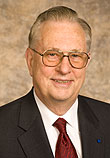Remarks

Dr. Arden L. Bement, Jr.
Director
National Science Foundation
Biography
Introductory Remarks
International Polar Year
National Academy of Sciences
Washington, DC
February 26, 2007
Good morning.
More than two centuries ago, Captain James Cook sailed the HMS Resolution southward -- attempting, in his wooden vessel, to penetrate the ring of ice surrounding the Antarctic Peninsula. Despite the extreme conditions, he persevered, returning two more times to seek a passage through the ice.
A few years later, Cook turned north toward another frontier, sailing for the Arctic Circle.
He could not have anticipated the wings of aluminum that would someday fly majestically over the ice caps, delivering scientists who probe, study, and observe, on behalf of the nations of the world. He could not have imagined the gleaming South Pole telescope that allows scientists to transcend earthly boundaries and peer far back in time.
All of these explorers, past and present, are worthy of our deepest respect. They dig deep into a frigid past and deliver knowledge for tomorrow. I'm delighted to join this distinguished gathering to celebrate their achievements with a pledge of more to come.
As a nation, we have explored the frontiers of discovery and innovation on and off the ice. Our support of research in the polar regions entails massive logistical challenges, and immense rewards. Because we persist, the world gains the ability to observe the early universe; model carbon cycles and weather patterns; and explore the diversity of life in extreme environments.
Our education activities give future scientists and engineers a chance to participate in international research teams. And through high-tech connections, we enable thousands of students across the planet to meet the people and animals that inhabit these remote regions.
Today, we launch an even greater scientific endeavor, in keeping with our national reputation for boldly charging the frontier.
The U.S. vision for the International Polar Year contains sweeping goals to which all of our organizations will contribute, individually and collectively.
The National Science Foundation's own research activities during IPY will focus on three areas.
One primary focus will be on climate change research and environmental observations. Our activities will support the goals of the U.S. Climate Change Science Program.
Our planet is changing more quickly than at any time in recorded history, and the frigid waters of the north, and frozen continent of the south, are helping us realize and understand that change.
We do not fully understand the causes of what we are observing. IPY has generated the national will to change that.
And new tools -- from satellites to ships to sensors -- make it possible to obtain the needed observations and synthesis of knowledge.
Already, NSF has helped launch the Arctic Observing System. In the coming seasons, we will probe deeply into both polar regions -- to answer complex questions of sea ice extent, retreating glaciers, and shifting patterns in flora and fauna.
A second primary focus will be to examine how life functions and survives in extreme environments. The research will focus on a variety of scales and a diversity of organisms.
A surprising variety of life flourishes in isolated locations such as the McMurdo dry valleys of Antarctica. And research on humans who thrive in polar environments will advance our understanding of our species' place in the web of polar activity.
A third NSF focus will be to standardize and record the data collected during IPY, to make it available and useful to current and future researchers.
We support these investments in research, education, and tools with excitement, commitment, and the anticipation of imparting new knowledge to a worldwide audience.
Because the questions are global in nature, U.S. scientists will collaborate with peers from around the world.
The teamwork begun through research and education can lead to broader cooperation among agencies and nations -- in policies for the oceans, the environment, and the full scope of human influences on the planet. As the government of one of the most powerful nations in the world, we are in a commanding position to strengthen the bridges that bind us to our common goals.
Today, we are refreshing our commitment to scientific leadership in the polar regions. And we are pledging our continued support of polar research, and meeting the challenges that it entails.
Now we are ready to break the ice and move forward with the vision and goals for the International Polar Year.


